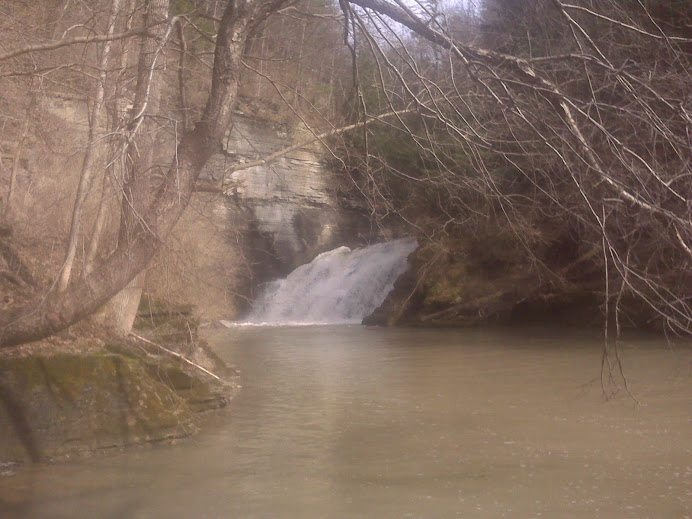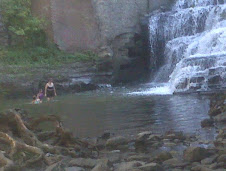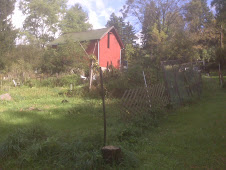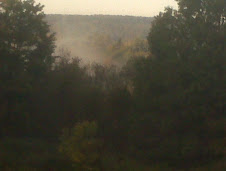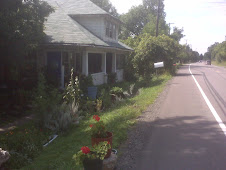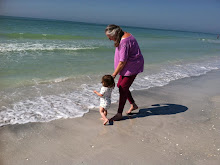November 6, 2009
The purpose of this blog is to document a turning point in the life of one social change-oriented nonprofit organization - the Level Green Institute - in Ithaca, New York.
We are embarking on a year of strategic planning. Our goal is to create a comprehensive, detailed long-term plan for developing and managing our land at 1519 Slaterville Road in the Town of Ithaca as an eco-retreat and community learning center.
This was our vision back in 1996 when it all began. It's now time to make it happen.
A number of us will be keeping this record as the months go by. For now, the opening voice is mine: Patricia Haines, age 64, grandmother, on leave from the dissertation stage of a PhD from Cornell University's Adult & Extension Education Program, living the life I've always dreamed of - as pro bono director of Level Green.
A bit of history ...
In March, 1996 twelve of us - students in Cornell's Adult Education PhD program, and staff members from the downtown Learning Web and Greater Ithaca Activity Center - caravanned to Tennessee to visit the Highlander Education and Research Center (aka Highlander Folk School), since the 1930s a mecca for grassroots participatory leadership training for social change. This is where the Civil Rights movement had been strategized. This is where, we hoped, we could learn how all the things we were studying with Cornell scholar/activist Professor David Deshler looked like in practice.
The week at Highlander was magical. Working sheep farm in the mountains north of Nashville; research library drawing folks from all over the world sharing our craving to learn how to make our dreams work; rocking chairs in a circle looking out over the Tennessee hills. Guy and Candy Carawan, steeped in mountain music; Helen Lewis, grassroots community organizer; other program staff coming and going, telling their stories. And singing their songs.
We'd been introduced to Highlander by Dorothy Cotton, former director of the Southern Christian Leadership Center's Citizenship Education Program and Highlander Board member. "We are the ones we are waiting for", she had us sing in the Cornell classroom. "Never doubt", she quoted Margaret Mead, "that a group of committed citizens can change the world - indeed, they are the only thing that ever does". "Folks who sing together", she added, reflecting on her experience during the Civil Rights movement years, "won't fight".
During the long drive back to Ithaca we discovered that most of us were returning with the same dream: to create a "Highlander-north", which - in the Folk School tradition - would be indigenous to Ithaca, not a copy from the mountains of Tennessee.
A place of beauty, serenity, fiscally self-sufficient, for residential programs focusing on participatory empowerment for social change. A place - and programs - for recharging creativity, bringing campus and community together to share wisdom and skill-building both ways, developing tactics and action plans addressing specific objectives. A nonprofit organization that would embody the best of Adult Education social change traditions, and serve both local and global needs.
Over the next few years we met once a month or more; used our course work to explore what an egalitarian non-profit organization could look like; researched Ithaca's nonprofit-rich community in search of a need that wasn't already being met; got discouraged; called Dorothy and got re-encouraged. In the Fall of 1999 we drew up by-laws for "the Level Green Institute", whose mission would be to "foster social, economic and environmental justice through education and the arts", in the spirit of the 150 year-old Danish Folk School.
Our name came from Level Green Road in the town of Caroline, around 10 miles southeast of Ithaca. Before starting graduate school at Cornell, I had tried to buy an old community church there, with some vague thought of turning it into a community center. Luckily, as things turned out, that didn't work.
In the Spring of 2000 we reached a critical threshold. As David Deshler pointed out, there is a huge leap from theoretical explorations, which are fun and exciting and creative, to "institution-building": 'growing' from vision to systematic organizational action and identity.
By March there were only three of us left. But, with David for courage - just a week after the Landmark Forum opened a crack in my personal resistance to being real rather than theoretical - we found ourselves in a lawyer's office. And by December that year Level Green was a legal reality: a non-profit educational organization, approved by the State Department of Education, and incorporated under the laws of the State of New York.
At Highlander we'd been counseled to focus on program and organizational ethos, not get bogged in land and capital developments. But that Fall some land found us that was too good to pass up.
I, we, had no money, no job, no steady income. The only fungible assets were my Cornell retirement account and the house where I'd raised my children and lived for thirty years - just a mile from 1519 Slaterville Road, for 55 years home to the Lowe family. Mrs. Cleo Lowe, widow of Professor Carl Lowe of Cornell's Agronomy Department, gave me a private mortgage because she liked the Level Green vision - and in mid-December these 8.5 acres with 1900s farmhouse and 1930s barn became mine.
Surrounded by the City of Ithaca's 800-acre Six Mile Creek nature reserve, with its reservoirs, cascading gorges, waterfalls and extensive pathway system, the Lowe farm had enormous potential to become the perfect home for our Level Green vision. Meadows, spruce forest, tangled vines 5 inches thick dancing along the pathways, two streams, three fallen-down stone walls. Beautiful. The intention from the start was to create a home for the organization, taking how many years it took. I would live there. We would generate income for Level Green through guest rooms.
Nice in theory. But needing an enormous amount of work: nine fuse boxes in the farmhouse; no insulation; clay and rock soil; peeling paint; old furnace, pipes, electrical system. House and barn close to NYS Route 79 (Slaterville Road), with traffic and trucks 24/7. Three story barn, built into the hill, stubbornly stable but starting to lean. Contrary to paperwork at purchase, no connection with the City sewer; and no visible septic system. Zoned strictly residential. Very high property taxes.
This past July I woke up one morning feeling like it was all too much. It was my birthday; I would give myself the gift of a month without planning, organizing anything, focusing on garden, peace and health. At noon I went down to the Ithaca Commons for some music - and met someone who turned all this around. So often happens: when one lets go completely, miracles start showing up.
Marnie Kirschgessner, Youth Development director for the Town of Ithaca, sat down next to me, to share the music. She asked how Level Green was going. And whether she might bring some of the Town's young people to the land sometime. As I shared some of our projects, and some of the long-term vision, she got quiet. And then offered to introduce me to the Town Supervisor who, she felt, might be interested in Level Green and the land in relation to the Town's revision of its strategic development plan.
And by the time I got home an email from her was waiting, aimed at setting up a time to take this gentle conversation up with the Town Supervisor.
Status November 2009
Now - after nine years of trying out the program vision, intentionally developing relationships with resource people and organizations, and testing whether Level Green could indeed generate sufficient income from guest rooms rentals to meet bottom-line operating costs - it seems that the time is ripe to take on the challenges of the land. Systematically, thoroughly.
Conversations are beginning with the Town of Ithaca, exploring possibilities for working together. Kali Northrop, an ex-Peace Corps volunteer trained in Landscape Architecture at Syracuse University's School of Environmental Sciences, has moved here to be part of the planning process. Together we are compiling a roster of possible partners, funding sources, specific objectives and activities for the next twelve-plus months. Next week we begin working with four MBA students from Cornell's Johnson Graduate School of Management, who have volunteered to develop a long-term strategic business plan for Level Green. We are reorganizing our Board of Directors, and calling together ting an Advisory Circle that we wrote into the by-laws but never activated.
A new commitment. Focus. Intentionality. A vigorous joy -
Vision Outline
In order of feasibility for planning and funding:
1. Zoning change: rezoning 1519 from Residential to Recreational so that it can serve as official home for the nonprofit Level Green Institute (would entail turning ownership over to Level Green)
2. Six Mile Creek Trailhead: creating formal Trailhead across the Cornell student-designed Gully Bridge <news.cornell.edu/chronicle/03/6.5.03/bridge> into the Six Mile Creek reserve (would require regrading driveway, constructing an eco-appropriate parking area, creating linkage trails, and formalizing an easement with the Town)
3. Incremental Landscaping: working with the full acreage as a “natural design studio” to create native plant, produce , herb, children’s and other gardens, an outdoor performance space, small eco-structures illustrating various forms of ‘green’ building (see Pine Tree Pavilion <pinetreepavilion.bushtoolbox.net>) and other amenities as indicated of interest to Town residents and project partners.
4. Barn as Community Center: renovating 1930s barn to serve as community arts space and rural wellness center
5. Farmhouse Renovation: renovating 1900s farmhouse to serve as Level Green administrative center and staff lodgings
6. Eco-Retreat Lodge: constructing an energy self-sufficient, state-of-the-future-art Retreat Lodge (would be unique in the region as space for residential programming as well as off-site meetings; preliminary architectural plans may be seen at <ithacaecohostel.blogspot.com>)
We know that this is an expensive, ambitious and time-consuming vision; but we feel it feasible, in terms of our own commitment for the long haul, partner-resources and the fiscal climate for ‘green’ education, job creation and capital initiatives.
Time will tell.

